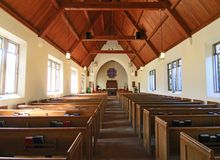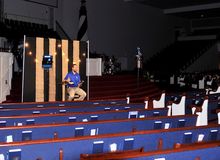


Churches following Covid-19 secure guidelines, can hold more than six people in total. “We want to make Jesus known and do lots to help rebuild this nation”, the EAUK says.

Would this already-ailing institution ever recover from lockdown?

The latest EKD report shows that Sunday attendance reached a new low: only 3.2% of the members went to church services. Baptisms, weddings and funerals also dropped.

The National Council of Evangelicals of France collected the data of 580 churches. 8 in 10 congregations have used video conferences and other online tools during the Covid-19 lockdown.

A Pew Research survey shows that 24% of adults say their faith has grown stronger, only 2% say it has become weaker.

Think and pray about the gaps that this unique season will create in our churches, as well as the new people that could be added.

Pastors of the Chinese Christian Church in Spain explain how they handle the Covid-19 crisis. “At work, we notice discrimination. Many think that the Chinese are carriers of the virus”.

The technology is able to analyse and report about the frequency of attendance, the mood, gender and average age of the people who attend a service.

Peruvian theologian Samuel Escobar analyses the decade from a missionary perspective: the changes in Christianity, the role of migration in evangelism, and the work for justice.

It might be more helpful to talk about Europe in the plural, to accept that there are probably several different versions of Europe.

Art forms are a powerful vehicle for spreading the knowledge of Christ.

An official survey shows that evangelicals are now 15.3% of the population. It is the faith group with the highest church attendance.

A report of the ‘Observatory of Laicité’ says the right to express one’s beliefs in public is protected by “internal and international laws”. Evangelicals are the faith group with the highest percentage of practicing believers.

Evangelicals are the only ones who have experienced a relative growth. There are 50,000 more than last year, the ISMU survey says.

1,400 of the 6,900 buildings in the country now serve other purposes: offices, museums, housing, etc.

“Nones” are a majority but cities are now more religious than rural areas, analysts say. Evangelicals grow to 1.6% of the population.

The Southern European country has transitioned from national Catholicism to secularism in only 25 years.

“Nones” represent 23.1% of the population, evangelicals 22,8%, and Catholics 23%. “Those of no religious faith will be the largest group in America in the next five years”.

Paul Copan, Chair of Philosophy and Ethics at Palm Beach Atlantic University, analyses why people leave the faith, and how they find reasons to return.

According to a survey conducted in the United Kingdom, the perfect Sunday “consists of waking up at 8:30 am to the smell of breakfast, a cuddle and three hours of television”.

For the first time in the history of the country where the Reformation began, there are more Catholics than Protestants.

A response to the Pew Research Center’s 2018 report, Being Christian in Europe.

To be strong in one area of religiosity does not guarantee that a person will be strong in other areas. Inconsistency may be evident in any one of the parameters of being Christian.

If you want to search and know God, his church is crucial.

Only 11 of the 31 church buildings will remain. “We are facing a crisis in the church […] the Kirk needs mission and outreach”, Reverend Ian Murray says.

Las opiniones vertidas por nuestros colaboradores se realizan a nivel personal, pudiendo coincidir o no con la postura de la dirección de Protestante Digital.